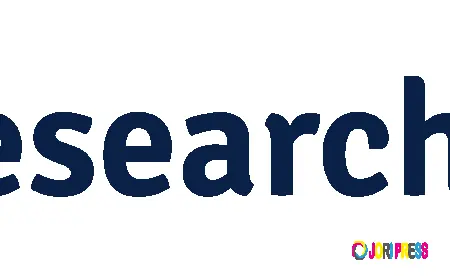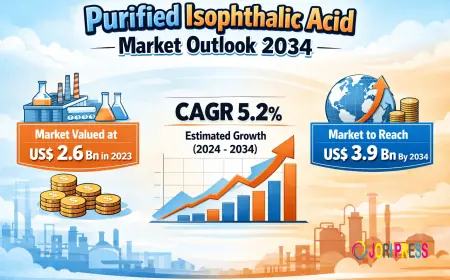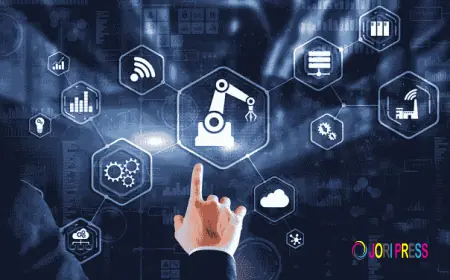Malaysia SaaS Market 2030 Outlook: Industry Size, Top Companies, and Future Trends
Industry Key Highlights
According to TechSci Research report, “Malaysia SaaS Market – By Region, Competition, Forecast and Opportunities, 2020-2030F”, Malaysia SaaS Market was valued at USD 1010.71 Million in 2024 and is expected to reach USD 2,360.16 Million by 2030 with a CAGR of 18.48% during the forecast period.
Request For Sample Copy of Report For More Detailed Market insight: https://www.techsciresearch.com/sample-report.aspx?cid=27605#requestform
This impressive growth is attributed to Malaysia’s accelerated digitalization efforts and the widespread adoption of cloud computing technologies. Government initiatives such as MyDIGITAL and the Malaysia Digital Economy Blueprint aim to transform the nation into a digitally advanced economy, thereby creating fertile ground for SaaS applications across all sectors. Businesses are actively seeking flexible, cost-effective, and scalable IT solutions, and SaaS is emerging as the preferred delivery model.
The SaaS ecosystem is witnessing expansion in vertical-specific applications, AI-powered analytics, collaboration tools, and cybersecurity solutions. From multinational corporations to small and medium enterprises (SMEs), organizations are investing in cloud-based software to streamline operations, enhance customer engagement, and future-proof their digital infrastructure.
Browse over XX Market data Figures spread through XX Pages and an in-depth TOC on " Malaysia SaaS Market.” @https://www.techsciresearch.com/report/malaysia-saas-market/27605.html
Emerging Trends in Malaysia’s SaaS Market
1. Vertical SaaS and Industry-Centric Solutions
Malaysia is seeing a shift from generic SaaS products to vertical-specific applications tailored for sectors such as healthcare, BFSI, retail, education, and manufacturing. These solutions cater to industry-specific regulations, workflows, and operational nuances, delivering higher efficiency and better ROI.
2. Low-Code and No-Code Platforms
The democratization of software development through low-code and no-code platforms is gaining traction in Malaysia. These tools empower non-technical users to build applications, automate tasks, and customize workflows without deep programming knowledge, thereby accelerating SaaS adoption among SMEs and startups.
3. Integration of AI and Machine Learning
SaaS solutions in Malaysia are becoming more intelligent with the integration of AI and machine learning. From predictive analytics and sentiment analysis to intelligent automation and chatbots, AI is enhancing decision-making capabilities and user experience within SaaS platforms.
4. Cybersecurity as a Core Offering
As cyber threats evolve, businesses are demanding SaaS platforms that offer robust, built-in security features. End-to-end encryption, multi-factor authentication, and compliance with Malaysia’s data protection regulations have become standard expectations.
5. Expansion of Hybrid Work Enablement Tools
Post-pandemic work structures continue to influence technology adoption. SaaS solutions such as Zoom, Slack, Microsoft 365, and cloud-based HRM tools are enabling businesses to support hybrid workforces with secure access, real-time collaboration, and digital task management.
Key Market Drivers
1. Digital Transformation Across Industries
Businesses across Malaysia are embracing digital technologies to remain competitive. SaaS facilitates this transformation by offering scalable solutions for CRM, ERP, analytics, HRM, and supply chain management, accelerating innovation without high upfront capital expenditure.
2. Government-Led Digital Economy Initiatives
Programs like MyDIGITAL and JENDELA are improving broadband infrastructure and encouraging cloud adoption. These initiatives create an enabling environment for SaaS vendors and ensure high-speed internet access even in rural and underserved areas.
3. Cost Efficiency and Operational Agility
SaaS offers predictable subscription models and eliminates the need for hardware investment and IT maintenance. This makes it highly attractive for SMEs, which dominate Malaysia’s business landscape and seek agile solutions for growth.
4. Increased Cloud Adoption
As businesses migrate from legacy systems to cloud platforms, SaaS adoption is naturally accelerating. Enhanced data accessibility, improved collaboration, and seamless software updates make cloud-native SaaS solutions indispensable.
5. Rise of the Remote and Hybrid Workforce
Remote work has become a permanent fixture in many Malaysian companies. SaaS applications that enable remote collaboration, digital document management, virtual meetings, and cloud-based productivity tools are in high demand.
Competitive Analysis
The Malaysia SaaS market is marked by intense competition, with global leaders, regional players, and local startups competing for market share. Differentiation is increasingly driven by vertical focus, AI capabilities, customer support, and compliance features.
Gcloud Technology Sdn. Bhd. (Freshworks Inc.)
Offers CRM and helpdesk solutions with a user-friendly interface. Its affordability and customization options make it popular among SMEs.
clickTRUE Malaysia (HubSpot, Inc.)
Focuses on inbound marketing, sales, and customer service SaaS. Known for seamless integration and robust automation tools.
Oracle Corporation Malaysia Sdn. Bhd.
Provides enterprise-grade SaaS for ERP, HCM, and supply chain, catering mainly to large businesses and government institutions.
SAP Malaysia Sdn Bhd
Specializes in business-critical SaaS applications, particularly ERP and analytics, enabling digital transformation in large enterprises.
Microsoft (Malaysia) Sdn Bhd
Dominates in office productivity and cloud services. Microsoft 365 and Azure-backed SaaS platforms serve both SMEs and large enterprises.
Transfingo (Malaysia) Sdn. Bhd. (Xero Limited)
Known for cloud accounting solutions, widely adopted by SMEs for bookkeeping, invoicing, and financial reporting.
Amazon Web Services Malaysia Sdn. Bhd.
Provides foundational cloud infrastructure and SaaS integration tools, powering third-party SaaS applications and development environments.
Telcowin Sdn. Bhd. (Salesforce, Inc.)
Leverages AI and cloud CRM platforms to offer customer engagement and sales enablement solutions, popular among Malaysian enterprises.
Google LLC (Alphabet Inc.)
Offers a suite of SaaS tools including Google Workspace and cloud AI services, widely used in education, startups, and SMEs.
Adobe Inc.
Dominates creative SaaS applications including design, video, and digital marketing tools, serving both individual professionals and enterprises.
Regional Outlook
East Malaysia: A Hotspot for SaaS Growth
East Malaysia, comprising Sabah and Sarawak, is witnessing accelerated SaaS growth due to strategic government initiatives and infrastructure investments. Programs like JENDELA are closing the digital divide, bringing fiber internet and 5G to remote areas. This connectivity enables SMEs and micro-enterprises to adopt cloud-based tools, thereby expanding the addressable market for SaaS providers.
The Sarawak Digital Economy Strategy 2030 further promotes the adoption of AI, automation, and cloud technologies. As local businesses embrace e-commerce, tourism management platforms, and digital finance tools, demand for specialized SaaS applications continues to rise.
Future Outlook
The Malaysia SaaS market is set to become a cornerstone of the country’s digital economy. With increasing reliance on data, cloud, and AI, SaaS platforms will evolve from operational tools to strategic enablers of innovation, resilience, and competitive advantage.
In the coming years, localized SaaS offerings will gain prominence, particularly those built for Bahasa-speaking users and customized to local regulatory environments. Moreover, the rise of multi-cloud environments and API-first architectures will empower businesses to build composable SaaS ecosystems tailored to their needs.
Enterprise SaaS adoption will move beyond traditional CRM and ERP systems, incorporating emerging categories like Robotic Process Automation (RPA), ESG reporting tools, and predictive supply chain platforms. Additionally, collaboration between public and private sectors will ensure inclusive access to SaaS across all regions and industries.
10 Benefits of the Research Report
-
Market Forecast to 2030 offering data-driven insights into Malaysia's evolving SaaS landscape.
-
Enterprise-Type Segmentation providing clarity on adoption trends among SMEs and large enterprises.
-
Technology Deployment Insights for public, private, and hybrid cloud preferences.
-
Application Analysis covering CRM, ERP, analytics, HRM, collaboration, and more.
-
Regional Focus with East Malaysia’s unique growth drivers and digital priorities.
-
Vendor Landscape Review profiling top global and local SaaS providers.
-
Trend Mapping including low-code platforms, cybersecurity, and AI integration.
-
Regulatory Overview including PDPA and government digitalization programs.
-
Investment and Innovation Tracking highlighting venture capital flows and R&D hotspots.
-
Strategic Recommendations to guide market entry, expansion, and product development.
Customers can also request 10% free customization on this report.
Contact US:
Techsci Research LLC
420 Lexington Avenue, Suite 300,
New York, United States- 10170
Tel: +13322586602
What's Your Reaction?
 Like
0
Like
0
 Dislike
0
Dislike
0
 Love
0
Love
0
 Funny
0
Funny
0
 Angry
0
Angry
0
 Sad
0
Sad
0
 Wow
0
Wow
0


















































